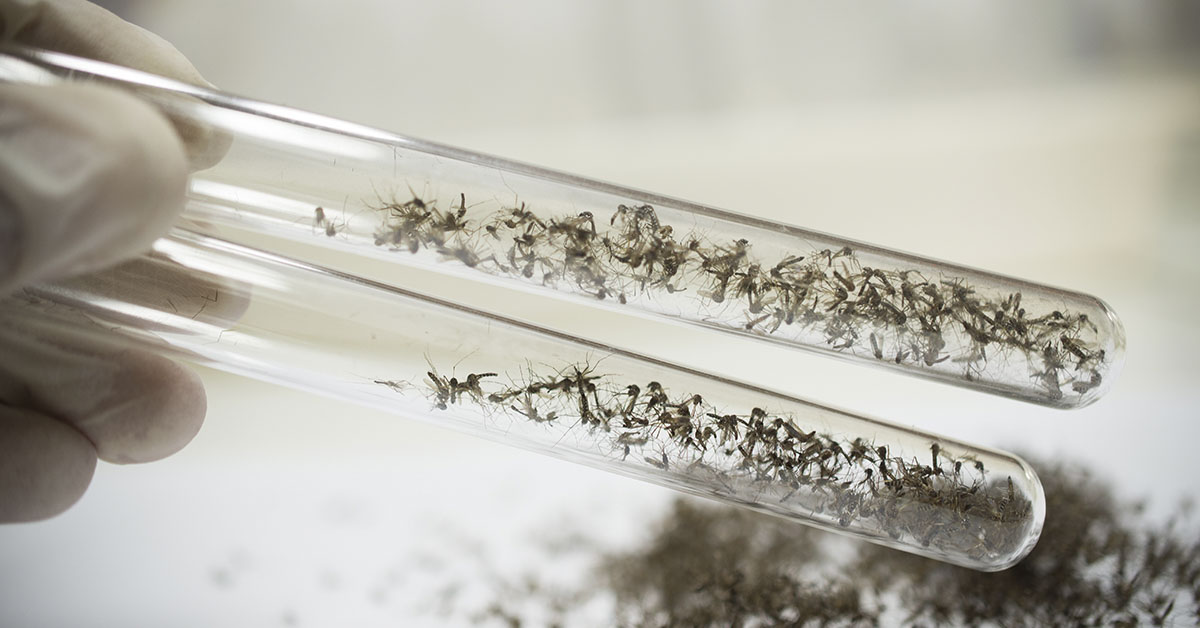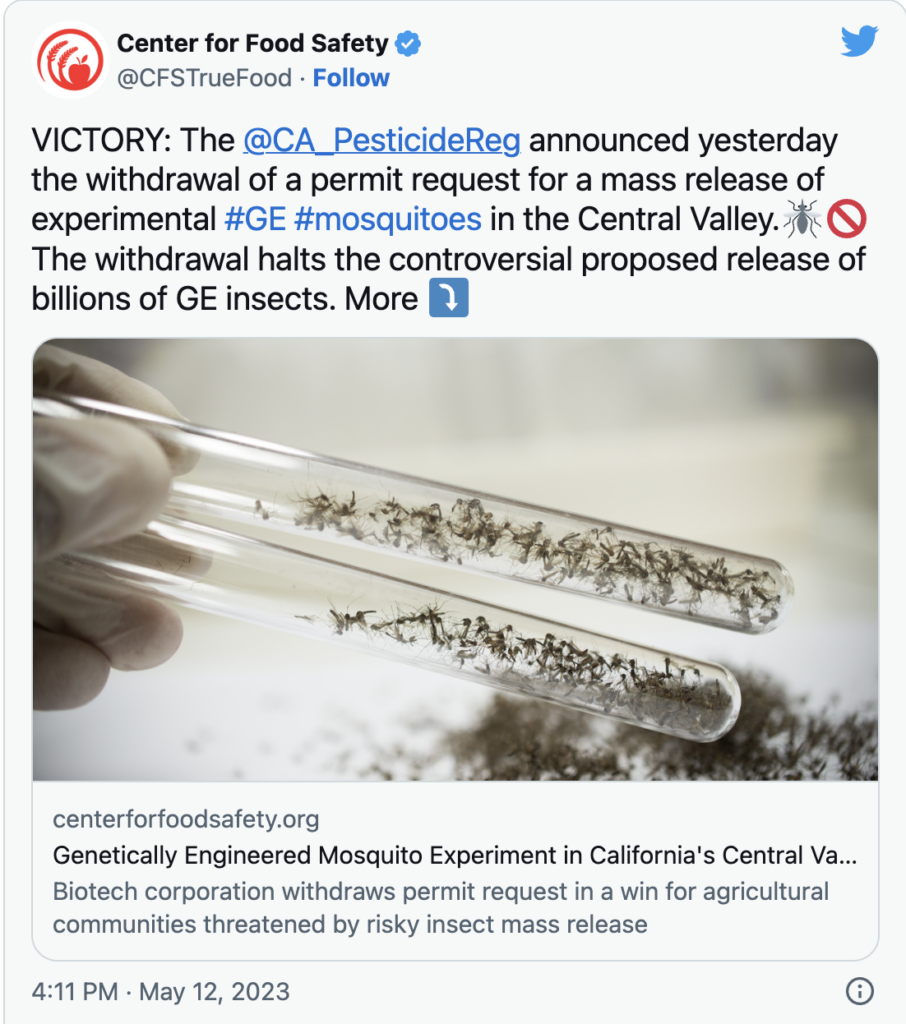In what some environmental groups call a ‘major win,’ the release of genetically engineered (GE) mosquitoes in California has been averted, at least for now. The company behind the project, Oxitec, has voluntarily withdrawn its application to release these mosquitoes, which had been funded by the Bill Gates Foundation.
Green Groups Relieved as Release of GE Mosquitoes Averted in California
Oxitec, funded by the Bill Gates Foundation, first proposed these genetically-modified mosquitoes in an effort to decrease mosquito-borne diseases. The company has already released these mosquitoes in Brazil, Panama, and elsewhere. However, the California release was set to be an open-air release in the United States. Some environmental groups, however, were not on-board.
Oxitec had submitted an application for the mosquito release to the California Government and were awaiting approval. The company, however, recently withdrew their application. The decision to withdraw the application was based on timing and approvals for the 2023 season, which Oxitec could not meet. The company plans to reapply next year and is expected to get its paperwork in order to carry out a pilot project in California. (1)
This news has been met with relief by environmental groups who have been campaigning against the release of GE mosquitoes in California. The Golden State did not reject the application due to any safety concerns, as some alternative health networks had implied.
“The withdrawal of Oxitec’s application is a victory for California residents and wild species,” Rebecca Spector, West Coast director at the Center for Food Safety, said in a statement.
What are GE Mosquitoes?
GE mosquitoes are genetically modified mosquitoes that have been engineered to reduce the spread of diseases such as dengue fever, Zika virus, and malaria. These mosquitoes are designed to breed with wild mosquitoes and pass on a gene that would prevent their offspring from surviving to adulthood. This would reduce the number of mosquitoes that can transmit diseases to humans.
Oxitec has been working on developing GE mosquitoes for over a decade. The company has conducted trials in several countries, including Brazil, the Cayman Islands, and Malaysia. The company then completed trials in a small town near Key West, Florida. Oxitec’s mosquitoes have been genetically engineered to contain a lethal gene that kills female offspring before they reach maturity. When these mosquitoes mate with wild male mosquitoes, their eggs never hatch because they do not contain the necessary machinery for development. (2, 3)
Read: Chemical found in widely used sweetener breaks up DNA in-vitro
Why the Opposition?
Despite the potential benefits of reducing the spread of diseases, there has been opposition to the release of GE mosquitoes. Certain environmental groups are concerned about the potential impact on the ecosystem and the unintended consequences that could arise from releasing genetically modified organisms into the wild. (4)
Critics argue that the long-term effects of releasing GE mosquitoes are unknown. They worry that there is a risk of unintended consequences, such as the emergence of new diseases or the extinction of other species. There is also concern that the release of GE mosquitoes could be used as a form of population control or as an excuse for governments to disregard human rights. Critics argue that there are many less risky ways to fight dengue than releasing genetically modified insects into the wild. They point out that dengue has been successfully controlled in other countries through the use of better sanitation and waste management, improved housing conditions and access to clean water.
The California Decision
In California, withdrawing the application for releasing GE mosquitoes was a victory for environmental groups who have been campaigning against the project for years. The decision, however, was based on timing and approvals rather than any safety concerns. The company intends to get their paperwork together and apply again next year, so this is more a delay rather than a full-on victory for the environmental groups.
The California Department of Food and Agriculture (CDFA) released a statement saying that Oxitec had voluntarily withdrawn its application for an experimental release of genetically engineered mosquitoes in California for the 2023 season.
The statement said that the CDFA will continue to work with Oxitec to ensure that any future applications for releasing genetically engineered mosquitoes in California meet all necessary requirements for safety and efficacy.
BREAKING: A permit for the mass release of genetically engineered mosquitoes in CA was just withdrawn!
— Friends of the Earth (Action) (@foe_us) May 12, 2023
This is a massive relief, especially for the communities who were set to be human guinea pigs for this experimental technology.
What’s Next?
The decision by Oxitec to withdraw its application for the release of GE mosquitoes in California is a victory for environmental groups who have been campaigning against the project for years. While the potential benefits of reducing the spread of diseases are significant, the risks of unintended consequences are too great to ignore.
The decision by Oxitec to reapply next year and the commitment of the California Department of Food and Agriculture to ensure that any future applications meet all necessary safety and efficacy requirements is a positive step forward. It is important that all stakeholders work together to ensure that any potential risks are identified and addressed before any release of GE mosquitoes into the wild.
Keep Reading: Mosquito Bites Sting and Swell? You Could Have Skeeter Syndrome
Sources
- “Update on Oxitec’s 2023 California Plans.” CDPR. May 11, 2023.
- “First genetically modified mosquitoes released in the United States.” Nature. Emily Waltz. May 2021.
- “First U.S. Open-Air Test of Genetically Modified Mosquitoes Deemed a Success.” Smithsonian Mag. Sarah Kuta. April 2022.
- “Green groups relieved as release of genetically engineered mosquitoes averted in California.” Salon. Britt Wilkins. May 13, 2023.


